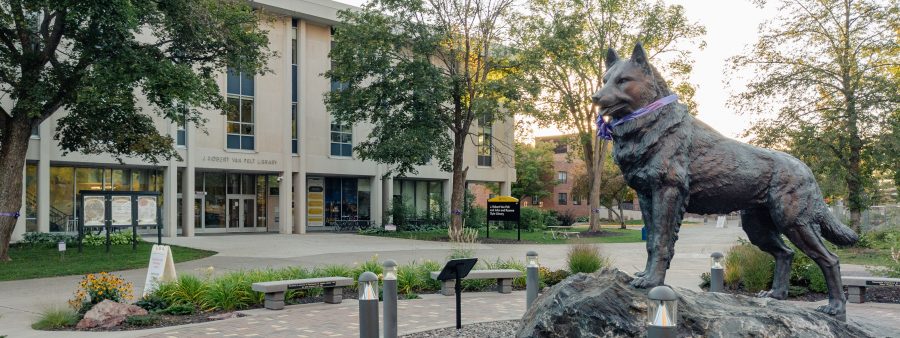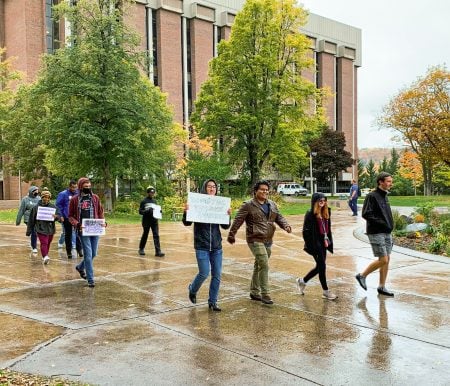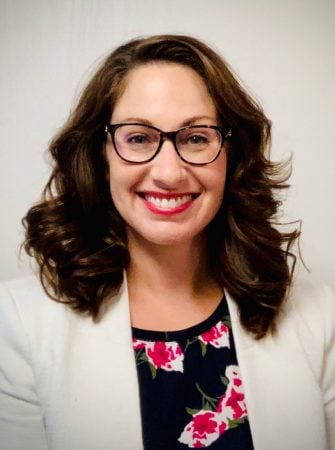
For more than 30 years, we have marked our observance of Domestic Violence Awareness Month (DVAM) with purple ribbons, awareness campaigns, and participation in local and national events. At Michigan Tech, purple ribbons around campus draw attention and awareness to the issues of domestic violence, domestic abuse, intimate partner violence, and relationship abuse. Student organizations also host events to raise awareness.
This is a crucial subject that can impact students, staff, and faculty. Take some time to learn about the background of this heritage month, statistics, misconceptions, how to support someone who is being abused, and current events taking place on campus.
Launching a Movement
Domestic Violence Awareness Month is rooted in the efforts of the National Coalition Against Domestic Violence (NCADV). They laid the early groundwork for the Battered Women’s Movement starting in the late 1970’s. In 1981, NCADV declared the first National “Day of Unity,” focused on honoring survivors, memorializing those who died to domestic violence, and uniting advocates working to end it. By 1987, Domestic Violence Awareness Month was launched nationally and the NCADV had created the first national toll-free domestic violence hotline. This movement and the tireless efforts of the NCADV have been credited with the significant progress that has been made in addressing and ending domestic violence over the past 30 years.
By the Numbers
When it comes to domestic violence, the statistics can be startling. According to the NCADV, “On average, nearly 20 people per minute are physically abused by an intimate partner in the United States. During one year, this equates to more than 10 million women and men.” Domestic violence can affect anyone and happens in every community, and it demands our attention. The NCADV goes on to report that “1 in 4 women and 1 in 7 men have been victims of severe physical violence by an intimate partner in their lifetime.” Data aggregated by the CDC shows that inequities also exist between groups, with marginalized groups “…at greater risk of experiencing sexual and physical dating violence.” Though the numbers are deeply troubling, it is also true that there are signs of positive change and hope. Prevention is possible when people speak up and engage.
On average, nearly 20 people per minute are physically abused by an intimate partner in the United States.
Make an Impact
Located in our own local community, the Barbara Kettle Gundlach Shelter Home is a safe haven that provides temporary shelter for victims and their families, as well as a variety of counseling, outreach, and advocate services. There are many ways you can support such important and necessary resources, including volunteering, making donations, or organizing an event to gather supplies for the shelter.
Mary Niemela, Barbara Kettle Gundlach Shelter Home director, has been working in this field for more than 30 years. She shared some of the biggest misconceptions that folks have concerning domestic violence. These domestic violence misconceptions include:
- caused by alcohol
- only affects the low-income population
- only happens in rural areas
- the victims are women
“This is a short list of the excuses of why domestic violence happens. Really though, it is a learned behavior that is passed on from generation to generation. In reality, domestic violence is not caused by alcohol, it’s used as an acceptable excuse,” Mary explained. “If you took the alcohol out of the relationship, you’d have a sober batterer. Domestic violence affects all socio-economic levels and can happen anywhere. Ninety-Five percent of victims are women; however, domestic violence affects all genders in a relationship.”

Involve Yourself at Michigan Tech
Every October, individuals and organizations come together to host events aimed at raising awareness about domestic violence. This is an essential part of the way we learn about and respond to domestic violence. If you are looking for resources to learn or ways to engage, there are several events taking place around campus and opportunities to support local organizations.
The student organization Sexual Assault and Violence Education (SAVE), responsible for hanging the purple ribbons and posting the awareness signs on campus, is hosting a donation drive for the Barbara Kettle Gundlach Shelter Home. Alyssa Everett, SAVE President, hopes these targeted efforts by their organization will bring awareness to the issues. “SAVE focuses on providing education, resources, and support to the campus community,” Alyssa said. “During October, our events focus on intimate partner violence. By providing access to these, SAVE hopes to create a safer space in our community and to make a direct or indirect impact on survivors. We hope that with our work, a friend will know how to support, a bystander will know how to intervene, and a survivor will have a safe way to get resources.”
In partnership with SAVE, the Society of African American Men (SAAM) also invites the community to their annual Walk A Mile in Her Shoes event on October 5. Each year the walk across campus brings awareness to gender-based violence. Male-identifying folks can choose to participate while wearing high-heeled shoes. Registration opens at noon in the Rozsa lobby.

About the Author
Jessica Gwosch
Interest Areas
- Education and Community Counseling
- Student success
- Title IX—Sexual and Intimate Partner Violence Prevention and Education
- All things Keweenaw
- Moved here two years ago after 14 years traveling as a military spouse
- I love the winters here!
Malachi Wilson, president of SAAM, shared the importance of supporting survivors through this event. “Walk a Mile in Her Shoes has been a staple of SAAM’s fall events for as long as I can remember. It’s an event where people of all genders come together to recognize the struggles of women in our lives and pay homage to the ones that have survived sexualized violence,” Malachi shared. “SAAM has used this event to demonstrate our support and deepen our understanding of the struggles of sexualized violence survivors by walking the mile every year and reiterating our pledge to create a safe and united community for all.”
DVAM provides a variety of opportunities at a local, state, and national level for you to learn ways to support survivors, advocate for victims, and contribute to social change. If you or someone you know is experiencing domestic and intimate partner violence, help is available.